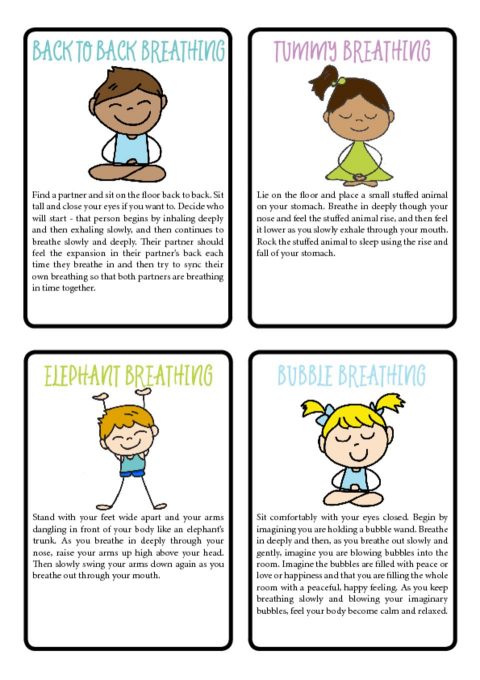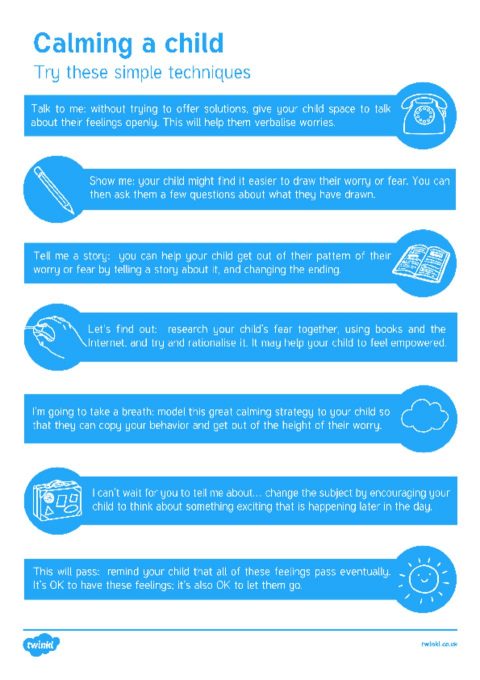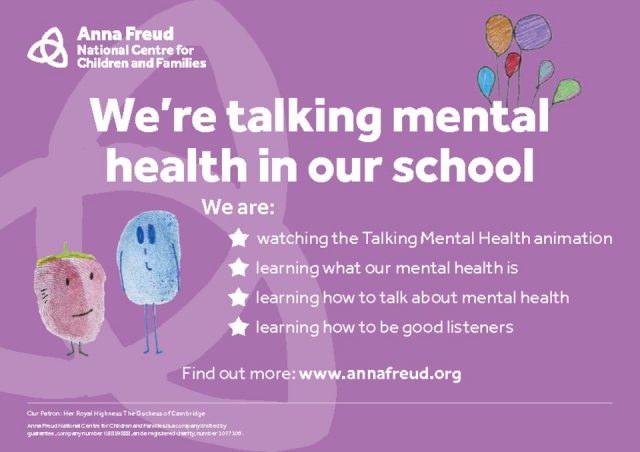**Please see the following Covid-19 Information Update from Norfolk County Council:**
Mental Health Support in Education
Many services and organisations have changed what they do as a result of COVID 19. Support for children and young people’s mental health and emotional wellbeing (formerly known as CAMHS) has also
changed.
www.justonenorfolk.nhs.uk/mentalhealth
This is now the single place to find out how to access mental health advice and support for 0 -25’sin Norfolk & Waveney. The key message is that you don’t need a referral, you can get in touch straightaway for advice and support. If you need more specialist help, we will make sure you get to the right person.
Children’s Mental Health Week 2023
The week beginning 6th February was Children’s Mental Health Week and the theme this year was ‘Let’s Connect’ The children explored this theme in their classes throughout the week as well as joining in with an assembly about the importance of connecting with others to help our wellbeing and mental health. Read more…
Children’s Mental Health Week 2022
The week beginning 7th February was Children’s Mental Health Week and the theme this year was ‘Growing Together.’ We started the week with an assembly thinking about growing emotionally and the children explored this theme in their classes throughout the week too. Read more…
We promote positive mental health and well-being with the children in our federation. The curriculum is designed to support this, as well as a range of strategies and programmes we have in place.
We work hard in school to promote positive mental health and well-being to ensure the children are able to cope with changes, emotions and situations in their lives that may be challenging. We know that all the children will face some difficulties throughout their lives and we want to support them to manage these appropriately and with confidence.
Mental Health is defined as a state of wellbeing in which every individual realises his or her own potential, can cope with the normal stresses of life, can work productively and fruitfully, and is able to make a contribution to her or his community. World Health Organisation
Mental health difficulties is a growing issue and it is affecting young people too. 3 out of 4 mental illnesses start in childhood (Mental Health Problems in Children and Young People, 2012)
- Things we do in school
- Useful Resources
- Useful websites and support contact information
- Special Events
- Holiday Fun Ideas
Interventions
Borris can beat it
A seven-session small group intervention to overcome anxiety and worry (foundation stage and KS1)
Programme developed by East Sussex Educational Psychology Service in partnership with the targeted Mental Health in schools project.
A structured programme of sessions which focus on feeling happy and safe, identifying feelings, what happens to our body when we feel worried, learning how to relax and feel good. How to talk to our family and friends and friends and review what we have learnt about how to help ourselves.
Happy to be me -Personal Development and Positive Mental Health for Children
This programme has been designed to be held as a small group (nurture style) intervention courses of 6 or 8 sessions, for 6 to 8 children at a time. The sessions focus on improving low self-esteem as this can impact on the ability to learn and progress for some children, and can also mean they do not have the confidence or skills to join in with some aspects of school life. Feeling a little worried or anxious can affect children throughout both their school and home life, meaning they find it difficult to cope with life’s challenges. Through this we will develop self confidence and self belief so children can see what they are capable of achieving.
Drawing and Talking
D & T is a child-centred therapy focusing on prevention, early intervention and overcoming worries or concerns they may have in their lives. Drawing and Talking is a 12 week programme which is a serial drawing technique for use with children and young people who may have been through a difficult time or are feeling worried or anxious which is affecting their ability to focus or concentrate. Drawing and Talking therapy supports children to realise their full potential, either socially or academically.
Emotional Literacy Support Assistant -ELSA
6 week + 1 week introduction- intervention
Most ELSA programmes will last for 6 weeks helping the pupil to learn some specific new skills or coping strategies. Clear programme aims (SMART targets) are set early on and each session has an objective – something we want to help the pupil understand or achieve. It may not resolve all difficulties for those with complex emotional needs but it should improve confidence and give them strategies to cope better. Change is a long-term process that needs everyone’s help. ELSAs help children and young people learn to understand their emotions and respect the feelings of those around them. They provide the time and space for pupils to think about their personal circumstances and how they manage them.
Curriculum
Promoting children’s personal, social health education is delivered throughout the school, and across the Federation, through the PATHS (Promoting Alternative Thinking Strategies) programme. This programme is designed to promote social skills, awareness and understanding, as well as supporting educational processes in the classroom.
The benefit of PATHS is that it improves: Self-Esteem, Self-Control, Emotional Intelligence, Classroom Behaviour, Conflict Resolution and Academic Engagement. Evidence supports that PATHS reduces: Aggressive Behaviour, Emotional Distress and Conduct Problems.
During the school day the children take part in yoga sessions which they watch on the screen. We use a website called ‘Cosmic Kids Yoga’ which is free to access and has a range of different yoga activities ranging in length and energy level. If you would like to do this with your child at home to promote positive mental health, follow this link http://www.cosmickids.com/
Clubs
We run a range of clubs across the federation. Some are run by staff and some are run by Year 6 children. Ukulele Club, Martial Arts Programme, Gardening, Baking, Lunchtime Lounge, Skills Club, Wellbeing club, sports clubs and Secret Club are a few that we run during the year.
At Toftwood federation we promote a range of clubs to suite everyone’s extra curricular interests. The benefit of taking part in clubs at school include:
- Make new friends
You’ll meet people who have similar interests to yours that you may not know already. - Build respect and learn team work
Team work and respect are two important life-skills that can carry you through life. By joining clubs or teams, you’ll learn to work together towards a common goal, learn respect for coaches, leaders, yourself, and one another. - Gain self-confidence
Completing a special project, playing a difficult piece of music, or being a valuable member of a team can help you gain self-esteem.; by participating in a club or other activity, you have the opportunity excel in something you enjoy and are good at. - Relieve stress
Many clubs and activities take place in a relaxed environment, so you have a chance to unwind and do things you like after a busy day at school. - Learn real-life skills
Many extra curricular activities provide a chance to learn real-life skills. - Develop time management skills
Joining clubs and other activities helps you learn the importance of planning and prioritising. - Keep children active– Lack of exercise is one of the contributing factors to poor mental and physical health
5 Ways To Wellbeing For Parents
The Mental Health Teacher account on You Tube, has videos for children to join in with different mindfulness and breathing techniques. youtube.com
Cosmic Kids Yoga has lots of different videos including yoga sessions, mindfulness, focus activities and calming stories. cosmickids.com
We have a range of emotional wellbeing resources in school if you request additional support.
Phrases Kids Said That Were Code Words for “I’m Anxious.”
If you have any concerns about your child’s mental health or well being please do not hesitate speak to a member of staff at school or visit your GP or ask the school to make a referral to the school nursing service.
- https://www.childline.org.uk/toolbox/
- https://www.mentallyhealthyschools.org.uk/
- https://www.mind.org.uk/
- minded.org.uk
- annafreud.org
- https://www.cwmt.org.uk/
- https://point-1.org.uk/
- https://youngminds.org.uk/
- http://www.elsa-support.co.uk/
Kirsty Ponder – Mental Health and Wellbeing Infant Lead, Mental Health Champion
Amy Rathi – Mental Health and Wellbeing Junior Lead
Norfolk County Council have resources on their website to support mental health and well being
See this link for further details – www.norfolk.gov.uk/children-and-families/send-local-offer/health/health-services-in-norfolk/mental-health-services/mental-health-resources
Place2Be: Parenting Smart (Support from child mental health experts)
parentingsmart.place2be.org.uk
Cosmic Kids Yoga Quest
An exciting adventure with Cosmic Kids yoga!
You have to complete 20 Cosmic Kids yoga adventures, across 5 different lands.
You can download your map pack PDF at the beginning of the Yoga Quest playlist. Print it out and check off the yoga adventures as you complete them and you can print off a certificate too! More information on the Cosmic Kids app or on this website – https://www.cosmickids.com/yogaquest/
Talking to your child about how they’re feeling can be hard. By taking 20 minutes with them to do an activity you’ll both enjoy, you’ll create a relaxed space to start that conversation.
Here are some ideas of activities that you could do in 20 minutes.
One: Play a ball game
Football, catch, basketball, dodgeball… there are endless ball games to choose from. You don’t need a court to play – just a garden, or a green space and a ball.
Top tip: Ask your child to pick a game they’d like to play or ask them about their favourite sports team.
Two: Ready, set… bake
Baking is a great way to have fun together and there are so many 20-minute bakes to choose from. Keep it simple with fairy cakes, scones, traybakes or energy balls.
Top tip: Take time to sit back and enjoy your bakes together while they’re still warm.
Three: Take a walk
Sometimes taking 20 minutes is as simple as taking a walk, whether it’s through nearby countryside, to the shops or around the block with the family dog.
Top tip: Leave some silent moments and create a space for your child to talk to about anything that’s on their mind.
Four: The ‘five things’ game
An easy one for you if you’re on the move, challenge one another to name five things you can see, four things you can touch, three things you can hear, two things you can smell and one thing you can taste.
Top tip: You can play this game anywhere, from the journey to school to shopping in the supermarket.
Five: Put on your dancing shoes
If your child loves to dance, let their feet do the talking. Ask them to pick out their favourite song and dance like you mean it!
Top tip: Teach one another some dance moves, and then see if you can come up with some dance moves of your own together.
Six: Go for a drive
Car journeys are a great opportunity for 20 minutes with your child. Encourage them to leave their phone for a while, turn down the radio and strike up a conversation.
Top tip: Not sure how to get them talking? Take a look at our conversation starters.
Seven: Explore together
When was the last time you explored somewhere new together? Stick a pin on a map somewhere nearby that neither of you have been to and try your best to get there!
Top tip: The best explorers use their senses, so switch off your phones, avoid distractions and use team work.
Eight: Flex those green fingers
Sow some seeds and watch them grow together! Begin with seedlings on the windowsill and watch them propagate before moving them into window pots or even the garden.
Top tip: There’s lots of opportunities to #Take20 with this one. If you’re not green fingered, begin with something easy like sunflowers or sweet peas.
Nine: Yoga time
Designed around controlled movement and breathing techniques, yoga is an easy one to do together at home. Grab a bit of floor space and give it a go!
Top tip: New to yoga? A quick search on YouTube will bring up lots of beginners’ videos you can try from the comfort of your own home.
Ten: Twenty-minute crafts
There are so many crafts you can do in 20 minutes. You could paint a plant pot, make a friendship bracelet, try origami, create a photo collage or make a musical shaker.
Top tip: Pinterest is full of inspiration. Create a board together so you can always find something you want to make.
Eleven: Design your own cards
All you need for this is some card and pens, and you can draw your own Christmas, Birthday, Thank You or Get Well Soon cards.
Top tip: You could use this as an opportunity to write a card to each other, and use what your child writes as a way to start the conversation.
Twelve: Share your music
For some people music is how they connect with the world. If this is true for your child, try sharing some music together by creating a playlist. You may surprise each other with your choices and even introduce each other to something new.
Top tip: You could try creating a playlist for a specific occasion, such as getting ready in the morning, or for when you’re in the car.
Thirteen: Cook together
Ask your child if there’s something they want to learn how to cook and make it with them.
Top tip: If cooking a meal together might be a bit too tricky, decorating pizzas with your own toppings could be an easier alternative.
Fourteen: Sing it
From car singing to serenading the family in the kitchen, turn up your favourite ballads and sing along.
Top tip: Want to make it into a game? Challenge them to sing in the style of their favourite film or TV character.
Fifteen: Indoor picnic
20 minutes isn’t quite enough time to head out to the beach with a picnic blanket, but it’s perfect for having one indoors. Lay out a blanket, pick out your family’s favourite finger food and have a picnic in the comfort of home.
Top tip: Indoors picnics have one simple rule – you can only eat when you’re sitting on the picnic blanket.
Sixteen: Tech-free games
Take a screen break with tech-free games like 20 questions, cat’s cradle, marbles, jacks, the floor is lava, skipping and more. There are so many traditional 20 minute games to choose from.
Top tip: Make it your own by adding new family rules to give your childhood games a modern twist!
Seventeen: Coffee shop date
Sometimes it’s nice to sit back with a cup of something warm and catch up! Whether you #Take20 before or between running errands or make a special trip, creating 20 minutes could be just want they need to get them talking.
Top tip: You don’t always need to plan your trip! Make a last-minute decision to treat them to whatever drink they like.
Eighteen: Create a boredom jar
Using an empty jar and pack of lolly sticks (pieces of paper also work well), write on each stick an activity you and your child can do when they’re bored. Activities could include watching their favourite film, baking, crafting or spending time with you.
Top tip: This is a great opportunity to think of activities for more #Take20 moments!
Nineteen: Draw cartoons of each other
Sometimes, all you need is pen and paper. Create cartoon drawings of one another, and other family members, cats, dogs, fish – have fun!
Top tip: Try drawing with your eyes closed or not taking your pen off the paper to add an extra challenge.
Twenty: Build a fort
Use blankets, bedsheets, cushions, chairs and fairy lights to create your own cosy little fort. Be warned: it will take several attempts to keep it all up, but so worth it once you’re inside!
Top tip: A mug of hot chocolate is a great fort accompaniment.









